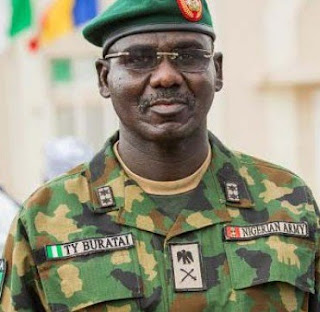 |
| Lt. Gen. Tukur Yusufu Buratai, the Chief of Army Staff of Nigeria |
AN encounter with Lt. Gen. Tukur Yusufu Buratai, the Chief of Army Staff, evokes memory of the legendary swashbuckling army general; the ramrod soldier, what one could describe as a soldier’s soldier. This soldier characteristically carries a soft mien; he is friendly and quite unassuming
Brewing with passion as he reels out facts and figures of the intricacies of the war against insurgency, Buratai sure knows his onions as the numero uno field marshal of Nigeria’s seemingly over-tasked Army. But he disagrees that the Nigerian Army is over-worked, despite being engaged on many fronts at the same time.
His approach is scientific. Shortly after mounting the saddle, precisely on 16 July 2015, the military high command did a SWOT analysis on the war in the North-East, dissecting the operation to identify the missing links and devise better, more efficient strategies to prosecute the war. Indeed, high on the list is the morale of soldiers then at its lowest ebb, high casualty rate, and inadequate equipment to confront the insurgents.
A strategic review dictated the replacement of Operation Zaman Lafia with Operation Lafia Dole. The change in name reflects the posture of the in-coming COAS. “The new name reflects our intention; the sense of urgency and the seriousness of the task at hand,” says Buratai.
Fighting and liberating Sambisa is not a tea party. The COAS says the forest is vast and complex. What the Nigerian forces have achieved is the conquest of Camp Zairo which was the main stronghold of the Boko Haram terrorists in Sambisa Forest; although criminal elements, badly decimated, are now desperate to survive. The attacks on commuters in Borno State and the deaths from IED witnessed of recent are desperate means of survival for the scattered insurgents.
The COAS says the solution to insurgency does not lie in military operations alone. “Solution lies in a comprehensive national approach. Nigerians have a role to play, royal fathers, opinion leaders and policy makers all have a role to bring peace to the land.”
Without betraying any emotion, the COAS thumbs his chest, figuratively, as he retorts: “We have succeeded in defeating insurgency.” The score card, he reels out: abduction by Boko Haram has given way to rescue of hundreds of innocent captives; the casualty rate among front line forces has been drastically reduced by 80 per cent.
Who are the sponsors of Boko Haram? Buratai says the military does not have an answer. The larger society, including the mass media, ought to give useful intelligence. But he offers some hints- 60 per cent of Boko Haram fighters killed or captured in battle are not Nigerians!
To many right-thinking Nigerians, the assault on the integrity of Buratai should be seen as a calculated, deliberately-hatched and well-orchestrated plan to tarnish the image of a leader who has a grasp of the rot in the system and who is determined to make a change.
Such unwarranted attacks is an attempt at diminishing the sterling image and reputation of a quintessential army officer, and by extension, casting shadows on the success of the Nigerian Military in waging the war against insurgency, terrorism and internal strife.
The emergence of Lt. Gen. Buratai as the COAS is perhaps the most widely-acclaimed political decision in recent times in restoring the integrity of the Nigerian Army. His style, carriage, professionalism and leadership-by-example posture has restored morale, confidence and nationalism in the average Nigerian soldier, especially those on the battle field. The Army owes this country a duty to preserve these gains. We must support this patriotic calling.
AbdulKareem is an Abuja-based policy analyst